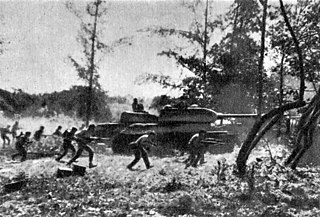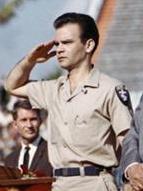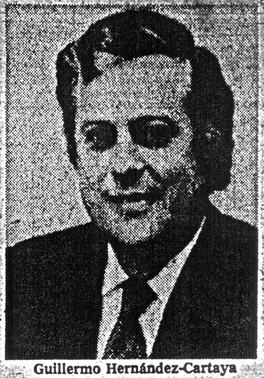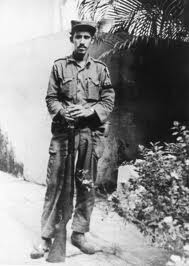Biography
Montero Duque was born in Matanzas, Cuba. In 1950, he graduated from the Military Academy of the Cuban Army with the rank of Second Lieutenant, eventually assuming the rank of Major. His military career can be traced to battles against the guerrilla forces of Fidel Castro. In 1956, Major Duque was instrumental in leading the Cuban Army during the regime of Fulgencio Batista against Castro and his rebel forces in the mountains of the Sierra Maestra in Oriente Province. After the Cuban Revolution of January 1, 1959, Duque was wanted by the revolutionary courts, accused of having committed human rights abuses against the civilian population during his service in Oriente. He fled Cuba, assisted by Pepe San Román. [1]
During the Bay of Pigs invasion in 1961, he commanded the Infantry Battalion No.5 of Brigade 2506. He was one of 1,189 members of Brigade 2506 captured by Cuban government forces. Duque was sentenced to 30 years in prison for murders committed before Castro's takeover. [2] The Cuban government agreed to release all but nine of them a year later, when the United States ransomed the prisoners for $53 million in food and medicine. Eight men remained, and later, the Cuban government released six more. One died and the second-to-last, Montero Duque (having spent 25 years in a Havana prison), was finally released in 1986. The last prisoner, Ramon Conte Hernandez, was released later that year. [3]
On June 8, 1986, Duque was released from prison in Cuba and reunited with his family in Miami, Florida and later Union City, New Jersey. He has served as Director and Editor of the newspapers El Cuba Libre and La Semana . He has twice been elected to serve as President of the Union of Former Cuban Political Prisoners. [4]
Duque has been a real estate agent since 1987. He was married to Esther, his wife of fifty years, who died in 2007.

The Bay of Pigs Invasion was a failed military landing operation on the southwestern coast of Cuba in 1961 by Cuban Democratic Revolutionary Front (DRF), consisting of Cuban exiles who opposed Fidel Castro's Cuban Revolution, covertly financed and directed by the U.S. government. The operation took place at the height of the Cold War, and its failure influenced relations between Cuba, the United States, and the Soviet Union.
Arnaldo Tomás Ochoa Sánchez was a Cuban general who was executed by the government of Fidel Castro after being found guilty of a variety of crimes including drug smuggling and treason. Allegations from a former Castro bodyguard claimed that Ochoa was executed, and Interior Minister Jose Abrantes sentenced to a 20-year prison term, allegedly to cover up high level Castro brothers involvement in the drug smuggling trade.

Manuel Francisco Artime Buesa, M.D. was a Cuban-American who at one time was a member of the rebel army of Fidel Castro but later was the political leader of Brigade 2506 land forces in the abortive Bay of Pigs invasion of Cuba in April 1961.
Corps General Abelardo Colomé Ibarra was a Vice President of the Council of State of Cuba and the Cuban Minister of the Interior, serving in the latter position from 1989, until his retirement in October, 2015. Known as Furry he first laid the foundations of State Security in 1959.
The Coordination of United Revolutionary Organizations was a militant group responsible for a number of terrorist activities directed at the Cuban government of Fidel Castro. It was founded by a group that included Orlando Bosch and Luis Posada Carriles, both of whom worked with the CIA at various times, and was composed chiefly of Cuban exiles opposed to the Castro government. It was formed in 1976 as an umbrella group for a number of anti-Castro militant groups. Its activities included a number of bombings and assassinations, including the killing of human-rights activist Orlando Letelier in Washington, D.C., and the bombing of Cubana Flight 455 which killed 73 people.
Víctor Emilio Dreke Cruz is a Cuban Communist Party leader of African descent, and a former commander in the Cuban Revolutionary Armed Forces.
Rafael del Pino is a former Cuban General of the Air Force and political dissident who defected to the United States by flying a civilian airplane from Cuba to Key West, Florida.

Guillermo Hernández-Cartaya was a Cuban banker born sometime in 1932 ; he spent 20 years as a banker in Cuba.
Brigade 2506 was a CIA-sponsored group of Cuban exiles formed in 1960 to attempt the military overthrow of the Cuban government headed by Fidel Castro. It carried out the abortive Bay of Pigs Invasion landings in Cuba on 17 April 1961.

José Ramón Fernández Álvarez was a Cuban Communist leader who was a vice-president of the Council of Ministers.
Erneido Andres Oliva Gonzalez was a Cuban-American who was the deputy commander of Brigade 2506 land forces in the abortive Bay of Pigs Invasion of Cuba in April 1961.

The Bay of Pigs Museum, also known as the Brigade 2506 Museum and Library, is the official museum in memory of the Bay of Pigs Invasion's Brigade 2506 in Little Havana, Miami, Florida.
José Alfredo Pérez San Román, known as Pepe San Román, was the commander of Brigade 2506 ground troops in the Bay of Pigs Invasion of Cuba in April 1961. Pérez was his father's last name.

Efigenio Ameijeiras Delgado was a Cuban military commander affiliated with Fidel Castro from the 1950s. Son of Manuel Ameijeiras Fontelo, a native of Pontevedra (Spain) and the Cuban María de las Angustias Delgado Romo, from Corral Falso, in Matanzas. At the age of four, his father disappeared, so his mother had to take care of her children alone.
Gerard "Gerry" Droller was a German CIA officer involved in the covert 1954 Guatemalan coup d'état and the recruitment of Cuban exiles in the preparation of the Bay of Pigs Invasion in April 1961.

Jack L. Hawkins was a United States Marines Corps colonel employed by the CIA for the military planning, training of Cuban exiles, and the effective military command of forces in the Bay of Pigs Invasion of Cuba in April 1961. Hawkins was known by the alias John Haskins.
Alfredo Joaquin González Durán is a Cuban-born lawyer and an advocate for dialogue as a way to bring regime change in Cuba. His views are considered controversial in some parts of the Cuban exile community in Miami.

The Castillo del Príncipe is a military fort located in the Loma de Aróstegui, in Havana, Cuba. In 1982, the fort was inscribed on the UNESCO World Heritage List, along with other historic sites in Old Havana, because of the city's importance in the European conquest of the New World, its fortifications, and its unique architecture.
Victor Andres Triay is a Cuban American historian and writer, known for the books Fleeing Castro: Operation Pedro Pan and the Cuban Children’s Program, Bay of Pigs: An Oral History of Brigade 2506, The Unbroken Circle, and The Mariel Boatlift: A Cuban American Journey.
Juan Jose Peruyero was a Cuban exile and anti-communist activist. He took part in the Bay of Pigs Invasion in 1961, and he later served as the president of its veteran association in Miami, Florida, where he was assassinated in 1977. He is the namesake of the Juan J. Peruyero Museum and Manuel F. Artime Library in Miami, also known as the Bay of Pigs Museum.







